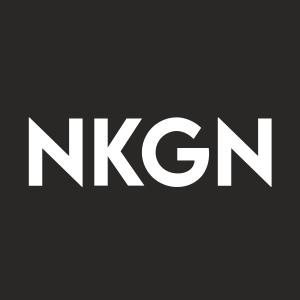NKGen Biotech Presents Troculeucel Mechanism of Action with Corresponding Phase 1 Biomarker Data at the Alzheimer’s Association International Conference 2025
Rhea-AI Summary
NKGen Biotech (OTC:NKGN) presented groundbreaking Phase 1 data for troculeucel, their innovative NK cell therapy for Alzheimer's disease, at AAIC 2025. The therapy demonstrated remarkable efficacy with 92% of patients (12 out of 13) showing stable or improved cognitive function after three months.
Key findings revealed that troculeucel can cross the blood-brain barrier and exhibits multiple mechanisms of action, including reduction of neuroinflammation and ability to degrade both amyloid and α-synuclein proteins. Notably, two out of three moderate AD patients receiving the highest dose improved to mild-stage AD, maintaining improvement through one year of treatment.
The treatment showed dose-dependent improvements in CSF biomarkers, with 100% of high-dose patients showing improvements in CSF α-synuclein levels after six months, while maintaining stable Aβ42/40 ratio and p-Tau 181 levels.
Positive
- 92% of patients showed stable or improved cognitive function (ADCOMS) after 3 months
- Two out of three moderate AD patients improved to mild-stage AD at highest dose
- 100% of high-dose patients showed improvements in CSF α-synuclein after 6 months
- Therapy demonstrates multiple mechanisms of action including protein degradation and neuroinflammation reduction
- Treatment shows ability to cross blood-brain barrier via CXCR3
Negative
- 70% of patients were treated at relatively low doses
- Limited patient sample size (n=13) in Phase 1 trials
- Only 3 patients received the highest dose treatment
News Market Reaction – NKGN
On the day this news was published, NKGN declined NaN%, reflecting a moderate negative market reaction.
Data tracked by StockTitan Argus on the day of publication.
- Troculeucel, a cryopreserved autologous, non-genetically modified NK cell product, appears to cross the blood brain barrier (BBB) via CXCR3, to reduce neuroinflammation via a simple IV administration.
- Troculeucel was shown to internalize and digest amyloid and α-synuclein proteins in vitro and to improve CSF levels of amyloid, α-synuclein, and p-tau in Phase 1 patients in a largely dose-dependent manner.
- Troculeucel identifies and eliminates auto-activated T cells without disrupting resting T cells in vitro; and improves neuroinflammation in patients, as measured by CSF levels of GFAP.
- As measured by ADCOMS,
92% of patients (combined data of n=13) had stable or improved cognitive function at 3 months.
SANTA ANA, Calif., July 28, 2025 (GLOBE NEWSWIRE) -- NKGen Biotech, Inc. (OTC: NKGN) (“NKGen” or the “Company”), a clinical-stage biotechnology company focused on the development and commercialization of innovative autologous and allogeneic natural killer (“NK”) cell therapeutics, today announced the presentation of a poster entitled, “Mechanism of Action of Troculeucel (Non-genetically Modified Natural Killer Cells with Enhanced Cytotoxicity) in Alzheimer's Disease Confirmed by Corresponding Phase I Biomarker Data” at the Alzheimer’s Association International Conference 2025 (“AAIC 2025”) held in Toronto, Canada and online from July 27-31, 2025.
Troculeucel is a first-in-kind, autologous, non-genetically modified NK cell product with significantly increased cytotoxicity and over
Elevated levels of chemokine CXCL9, CXCL10, and CXCL11 have been detected in cerebrospinal fluid (“CSF”) during neuroinflammatory conditions. These ligands bind to the chemokine receptor CXCR3 and are believed to be locally produced by CNS-resident cells, including astrocytes and microglia, in response to inflammatory signals associated with protein deposition. In AD, the accumulation of misfolded proteins elicits a cascade of autoreactive T-cell mediated neuroinflammation and neuronal damage. These T cells have been shown to exhibit high CXCR3 chemokine receptor expression enabling them to cross the BBB. Troculeucel is a highly enhanced activated NK cell therapy with
Troculeucel was found to exhibit over
NKGen’s in vitro data demonstrated that troculeucel had, similarly to microglial (HMC3) cells, the ability to internalize and degrade both amyloid and α-syn aggregates. In patients (n=10) treated for three months only, and, despite
With respect to a surrogate neuroinflammatory biomarker, Glial Fibrillary Acid Protein (“GFAP”), 6/10 patients showed decreased levels after 3 months, despite administration of relatively low doses of troculeucel. Remarkably, after 6 months all three patients treated at the highest dose level of 6 x 109 cells per infusion had improved CSF and plasma levels of GFAP.
Twelve out of 13 patients (
“As we collect more clinical and biomarker data, we continue to gain even more insight into troculeucel’s mechanism of action (“MOA”),” said Paul Y. Song, M.D., Chairman and Chief Executive Officer of NKGen. “Unlike therapies that solely target a specific protein, we have shown that troculeucel can safely improve CSF levels of amyloid, α-synuclein, and tau proteins while also identifying and eliminating autoreactive T cells while sparing resting T cells, to reduce neuroinflammation. We believe this unique ability of our enhanced NK cells which appear to cross the BBB to affect multiple disease pathways, is why we are seeing such encouraging clinical results as well. Rather than slowing the rate of cognitive decline, we are demonstrating potential cessation of decline and real cognitive improvement in the vast majority of patients treated to date. We believe based on the MOA, that troculeucel has promise for several other neurodegenerative diseases beyond Alzheimer’s disease.”
Data Highlights from the Poster Presentation:
- Troculeucel shows high expression of receptors involved in modulating neuroinflammation and cell migration, shows increased cytotoxicity against activated T cells, migrates towards the CSF, and degrades Aβ42/40 and
α-synuclein aggregates in vitro. - Twelve out of 13 patients (
92% ), with a median CDR-SB score of 10 at enrollment, had either stable or improved ADCOMS scores after three months of treatment. - Notably, two of the three patients with moderate AD who received the highest dose of troculeucel improved to mild-stage AD after just three months of treatment. Both patients maintained improvement through the one-year treatment period, as measured by CDR-SB and ADCOMS scores.
- We propose that troculeucel crosses the BBB via CXCR3 expression and modulates neuroinflammation caused by autoreactive T cells as well as protein aggregation in patients.
- Our results are supported by high NKG2D, DNAM-1 and CXCR3 expression, and consistently decreased CSF GFAP and α-synuclein levels at 3 and 6 months of treatment and while Aβ42/40 ratio and p-Tau 181 remained stable.
A copy of the poster, along with previously disclosed Phase 1 data demonstrating the positive effects of troculeucel (SNK01) on amyloid, tau, and neuroinflammation biomarkers in Alzheimer’s patients, can be accessed on the Company’s website Scientific Publications page: https://nkgenbiotech.com/scientific-publications/.
About NKGen Biotech
NKGen is a clinical-stage biotechnology company focused on the development and commercialization of innovative autologous and allogeneic NK cell therapeutics. NKGen is headquartered in Santa Ana, California, USA. For more information, please visit www.nkgenbiotech.com.
About Troculeucel
Troculeucel is a novel cell-based, patient specific, ex vivo expanded autologous NK cell immunotherapeutic drug candidate. NKGen is developing troculeucel for the treatment of neurodegenerative disorders and a broad range of cancers. Troculeucel is the International Nonproprietary Name (“INN”) for SNK01 assigned by the World Health Organization (“WHO”). The WHO INN approval of troculeucel establishes a universally recognized nonproprietary drug name for SNK01 and marks a significant step on NKGen’s journey toward bringing this therapy to market.
Forward-Looking Statements
Statements contained in this press release may contain “forward-looking statements” within the meaning of Section 27A of the Securities Act and Section 21E of the Securities Exchange Act of 1934, as amended. Forward-looking statements may be identified by the use of words such as “anticipate”, “believe”, “could”, “continue”, “expect”, “estimate”, “may”, “plan”, “outlook”, “future” and “project” and other similar expressions that predict or indicate future events or trends or that are not statements of historical matters. Because such statements are subject to risks and uncertainties, many of which are outside of the Company’s control, actual results may differ materially from those expressed or implied by such forward-looking statements. Such statements include, but are not limited to, statements regarding the Company’s plans and expected timing for developing troculeucel and SNK02, including the expected timing of completing and announcing further results from its ongoing clinical studies; and the Company’s expected timing for developing its product candidates and potential benefits of its product candidates. Risks that contribute to the uncertain nature of the forward-looking statements include: the Company’s ability to execute its plans and strategies; risks related to performing clinical studies; the risk that initial and interim results of a clinical study do not necessarily predict final results and that one or more of the clinical outcomes may materially change as patient enrollment continues, following more comprehensive reviews of the data, and as more patient data become available; potential delays in the commencement, enrollment and completion of clinical studies and the reporting of data therefrom; the risk that studies will not be completed as planned; the risk that the abstract will not be published as planned including delays in timing, format, or accessibility; and NKGen’s ability to raise additional funding to complete the development of its product candidates. These and other risks and uncertainties are described more fully under the caption “Risk Factors” and elsewhere in the Company’s filings and reports, which may be accessed for free by visiting the Securities and Exchange Commission’s website at www.sec.gov and on the Company’s website under the subheading “Investors—Financial and Filings”. Investors should take such risks into account and should not rely on forward-looking statements when making investment decisions. All forward-looking statements contained in this press release speak only as of the date on which they were made. The Company undertakes no obligation to update such statements to reflect events that occur or circumstances that exist after the date on which they were made, except as required by law.
Internal Contact:
Denise Chua, MBA, CLS, MLS (ASCP)
SVP, Corporate Affairs
949-396-6830
dchua@nkgenbiotech.com
External Contact:
Kevin Gardner
Managing Director
LifeSci Advisors, LLC
kgardner@lifesciadvisors.com








